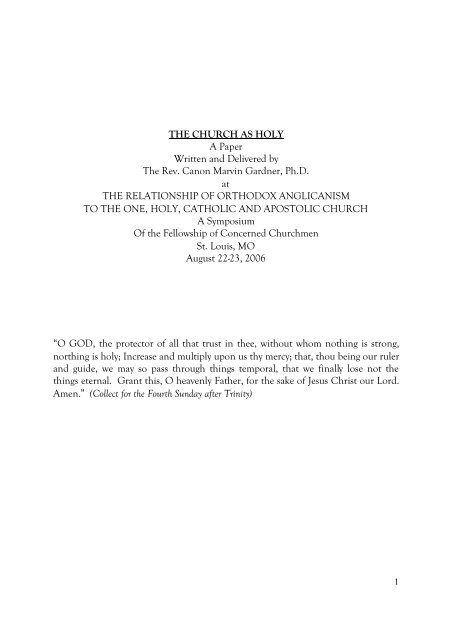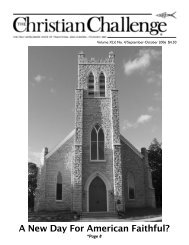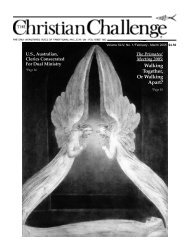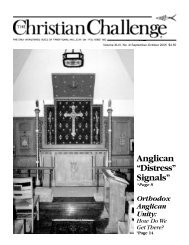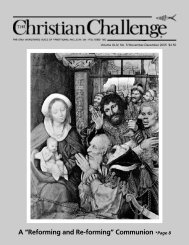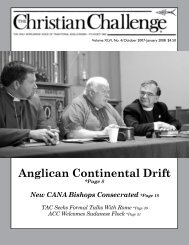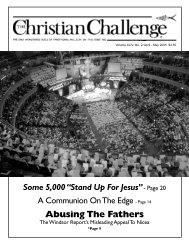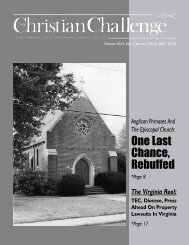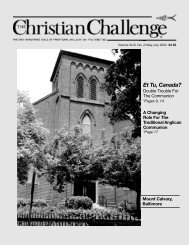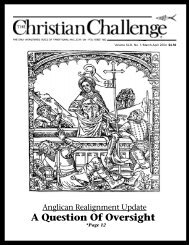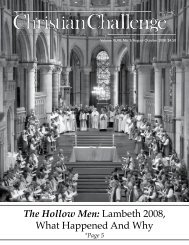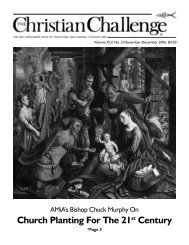THE CHURCH AS HOLY A Paper Written and Delivered by The Rev ...
THE CHURCH AS HOLY A Paper Written and Delivered by The Rev ...
THE CHURCH AS HOLY A Paper Written and Delivered by The Rev ...
Create successful ePaper yourself
Turn your PDF publications into a flip-book with our unique Google optimized e-Paper software.
<strong>THE</strong> <strong>CHURCH</strong> <strong>AS</strong> <strong>HOLY</strong><br />
A <strong>Paper</strong><br />
<strong>Written</strong> <strong>and</strong> <strong>Delivered</strong> <strong>by</strong><br />
<strong>The</strong> <strong>Rev</strong>. Canon Marvin Gardner, Ph.D.<br />
at<br />
<strong>THE</strong> RELATIONSHIP OF ORTHODOX ANGLICANISM<br />
TO <strong>THE</strong> ONE, <strong>HOLY</strong>, CATHOLIC AND APOSTOLIC <strong>CHURCH</strong><br />
A Symposium<br />
Of the Fellowship of Concerned Churchmen<br />
St. Louis, MO<br />
August 22-23, 2006<br />
“O GOD, the protector of all that trust in thee, without whom nothing is strong,<br />
northing is holy; Increase <strong>and</strong> multiply upon us thy mercy; that, thou being our ruler<br />
<strong>and</strong> guide, we may so pass through things temporal, that we finally lose not the<br />
things eternal. Grant this, O heavenly Father, for the sake of Jesus Christ our Lord.<br />
Amen.” (Collect for the Fourth Sunday after Trinity)<br />
1
It is my great honor <strong>and</strong> pleasure to speak with you this morning on the note of<br />
holiness as we consider the relationship of orthodox Anglicanism to the One, Holy,<br />
Catholic <strong>and</strong> Apostolic Church. As you no doubt are aware, the note of Holiness is<br />
not included in the translation of the Nicene Creed as it appears in the Traditional<br />
Book of Common Prayer. Was its exclusion best explained as a printer’s error<br />
Perhaps the omission of the word Holy was a providential foretelling of the desperate<br />
state into which the Anglican Communion has plunged in this Third Millennium<br />
after the birth of Jesus Christ. As for those of us who decided to continue<br />
Anglicanism outside of the Anglican Communion, the presence of actualized holiness<br />
has eluded much of our own short history as well. However, all of us present at the<br />
Symposium are bound together in our separate jurisdictions <strong>by</strong> our claims <strong>and</strong><br />
counterclaims to Apostolicity <strong>and</strong> Catholicity as well as our common need of a<br />
deeper penetration <strong>by</strong> the Holy Spirit who is the source of all holiness within any<br />
branch or twig of Christ’s One, Holy, Catholic <strong>and</strong> Apostolic Church.<br />
Almost 30 years ago, I made my exit from the parish ministry of the Episcopal<br />
Church after spending almost 10 years as a parish priest. During the late 60’s <strong>and</strong><br />
early 70’s, I had become absolutely convinced that the ferment of liturgical trial use<br />
was opening the gates of a more Catholic <strong>and</strong> evangelical future for the Episcopal<br />
Church. I had survived Virginia <strong>The</strong>ological Seminary with my Catholic theology<br />
intact. I had no doubt as the youngest rector in the Episcopal Diocese of<br />
Washington in 1969 that the next edition of our Book of Common Prayer would<br />
advance the Holiness, Catholicity <strong>and</strong> Apostolicity of the Episcopal Church through<br />
new, all be it pre-Nicene, rites <strong>and</strong> ceremonies.<br />
During the early 1970’s, as I grew my small parish in the distant suburbs of<br />
Washington into a center of liturgical renewal, I became increasingly disillusioned<br />
<strong>by</strong> the events in the Episcopal Church both nationally as well as in the Episcopal<br />
Diocese of Washington. While I had been active in the urban training program in<br />
the innercity <strong>and</strong> had done more than my share of foot-soldiering in the civil rights<br />
movement, I was uneasy as an ever-changing kaleidoscope of groups came into focus<br />
on the Episcopal Church scene. In rapid succession, the rights of women, youth<br />
<strong>and</strong>, eventually, homosexuals began to emerge as central organizational concerns<br />
within the Episcopal Church.<br />
Rather than remain in the ferment of the late 70’s in a parish of the Episcopal<br />
Church, I left active parish ministry in the Church, as well as my founding<br />
membership in the Washington Episcopal Clergy Association <strong>and</strong> my seat on the<br />
Diocesan Council. For the next 18 years, I engaged myself in the specialized<br />
ministry of pastoral counseling, personal growth as a client in psychotherapy, <strong>and</strong><br />
graduate work in pastoral theology <strong>and</strong> clinical psychology. I earned my living as a<br />
staff member in both ecumenical <strong>and</strong> marriage <strong>and</strong> family counseling agencies. My<br />
academic interest has been in the relationship between Catholic faith <strong>and</strong> practice<br />
2
on the one h<strong>and</strong> <strong>and</strong> British psychoanalytic theory <strong>and</strong> practice on the other h<strong>and</strong>.<br />
My last ministry as a non-parochial Episcopal priest was as an associate professor for<br />
three years at Loyola College of Maryl<strong>and</strong> in Columbia, Maryl<strong>and</strong>. <strong>The</strong>re I taught<br />
<strong>and</strong> did clinical supervision of clergy <strong>and</strong> vowed religious who were doing Ph.D.<br />
studies in pastoral counseling. Most of my students were preparing to become fulltime<br />
pastoral counselors <strong>and</strong> psychotherapists within Christian parishes or within<br />
their vowed religious communities.<br />
One day, when I had just turned 50, in a supervision group at Loyola, a<br />
Roman Catholic Franciscan priest in his mid-40’s presented a tape. He was<br />
counseling an AIDS patient as part of his doctoral internship with an area hospice.<br />
<strong>The</strong> patient, a young man from Baltimore who was in his mid-twenties, spoke on the<br />
tape with great strain <strong>and</strong> anxiety. He knew that he was in the late end stage of his<br />
life. His Franciscan counselor listened in silence. <strong>The</strong>n, as the young man signaled<br />
<strong>by</strong> his hesitant speech that he was afraid, perhaps having feelings of unnamed guilt<br />
<strong>and</strong> dread, his counselor spoke, “It is time to let go. Release your spirit. Don’t be<br />
afraid.” <strong>The</strong> dying man was quiet for a few long seconds. <strong>The</strong>n he said, “But I am<br />
not ready to die yet!” At this point, the Franciscan shut off his tape recorder <strong>and</strong><br />
looked around the classroom at the group which was made up of two nuns, a<br />
Seventh Day Adventist pastor, the presenter <strong>and</strong> myself. I asked the presenter,<br />
“What would you like from the group” <strong>The</strong> Franciscan answered, “I am so<br />
frustrated. This man has already passed through the stages of denial, bargaining <strong>and</strong><br />
anger. Now, he refuses to move into the last stages of acceptance. What must I do”<br />
At that moment, filled as I was <strong>by</strong> a curious mixture of empathy for the dying man<br />
<strong>and</strong> antipathy toward the Franciscan, I asked a question: “Is the man who is dying a<br />
Roman Catholic” <strong>The</strong> answer came back, “Yes, but why do you ask” I replied,<br />
“Does he have a priest who is preparing him for death” <strong>The</strong> Franciscan looked at<br />
me, his eyebrows raised <strong>and</strong> his expression one of surprise. “That is what I am<br />
doing” he said in contemptuous tone of voice. “That is why I am asking the group’s<br />
help.” <strong>The</strong> other group members nodded in underst<strong>and</strong>ing. “I am trying to get this<br />
man to accept his death.” With a lump in my throat <strong>and</strong> a tear in my eye, I<br />
responded, “Oh yes, of course.”<br />
<strong>The</strong> Franciscan student, the dying young man <strong>and</strong> the members of the group<br />
had made eternally important choices as to the nature of the holy. <strong>The</strong>y had been<br />
taught <strong>by</strong> their ecumenical faculty, <strong>and</strong> had accepted, that holiness was to be<br />
operationally defined in their counseling ministries <strong>by</strong> the psychological concept of<br />
wholeness. As a result of this unnoticed yet dramatic deconstruction <strong>and</strong><br />
reconstruction of the meaning of the term holy, each of these ministers was now<br />
operating with an underst<strong>and</strong>ing of holiness which was devoid of transcendence.<br />
Whatever Catholic theology of the holy that these students had left, it had been<br />
separated from the pastoral counseling task. In its place was a psychological theory<br />
developed <strong>by</strong> a kindly atheist psychiatrist. I appeared to be the only person in the<br />
3
supervision group who even noticed the substitution of the psychological for the<br />
theological basis of pastoral care which was clearly in evidence.<br />
It is crucial that orthodox Anglicanism be defined <strong>by</strong> adherence not only to<br />
the Traditional Book of Common Prayer, but that it also has theological roots in<br />
traditional Anglican theology. For any continuing Anglican body which is rooted in<br />
the Catholic underst<strong>and</strong>ing of the Traditional Book of Common Prayer, the<br />
theology of the neo-Thomistic theologian, Francis J. Hall, found in his ten-volume<br />
series, Dogmatic <strong>The</strong>ology, provides a sound theological foundation. In Volume<br />
VIII of that series, <strong>The</strong> Church <strong>and</strong> the Sacramental System, Dr. Hall addresses the<br />
four notes of the Church. <strong>The</strong>re he makes the important point that holiness <strong>and</strong><br />
righteousness are related but not synonymous concepts (see page 187). A righteous<br />
person is one who does what is morally correct <strong>and</strong> who may be described as having<br />
developed a moral character. Holiness, on the other h<strong>and</strong>, “is to be reconsecrated<br />
<strong>and</strong> assimilated to God, such consecration <strong>and</strong> assimilation to God cannot be<br />
completed unless [a person] becomes morally righteous. None the less, holiness is a<br />
different thing.”<br />
<strong>The</strong> Franciscan in my illustration, <strong>and</strong> many Christians in general, have<br />
ab<strong>and</strong>oned the underst<strong>and</strong>ing of holiness as separation <strong>and</strong> assimilation to God <strong>and</strong><br />
have either substituted moral righteousness for holiness or have ab<strong>and</strong>oned moral<br />
righteousness except as a goal of political activity or psychological development. When<br />
a minister of a Christian body, Anglican or otherwise, substitutes psychological<br />
wholeness for holiness leading to righteousness, a hideous change has occurred in his<br />
ministry. <strong>The</strong> pastoral care given becomes secularized. <strong>The</strong> intellectual shift which<br />
takes place is a post-modern deconstruction of the concept of holiness. <strong>The</strong> postmodern<br />
minister then turns aside from healing the immortal souls of men <strong>by</strong><br />
making them citizens of the Kingdom of God for eternity. Instead, this unnoticed<br />
but radical reframing of holiness turns the minister’s focus toward achieving some<br />
version of either self-fulfillment <strong>and</strong>/or political reform. Holiness becomes wholeness.<br />
On a spiritual level, the Christian who faces death has as his last hope either selfsatisfaction<br />
at his righteous participation in human political <strong>and</strong> social evolution or<br />
his pride in having achieved some advanced psychological state in the face of a nonexistent<br />
transcendent God. Psychological maturity on one’s death bed replaces spiritual<br />
reconciliation.<br />
Dr. Hall points out that the God who works on earth through His Son, Jesus<br />
Christ, has created an ecclesia, His Body on Earth, to ready men <strong>and</strong> women for an<br />
eternal destiny through the power of the Holy Spirit. When Christian ministers<br />
recognize that they are ordained to act in the name of such a Church, while<br />
appreciating the value of psychological <strong>and</strong> political righteousness, they place their<br />
personhood in the service of the Holy Spirit as instruments of holiness leading to<br />
righteousness among God’s people. Such ministers will resist the post-modern<br />
pressure to reduce the human psyche to simply the epiphenomenon of a time<br />
4
limited biological process. When holiness has become wholeness <strong>and</strong> righteousness<br />
has been transformed into developmental self-fulfillment, the transition from<br />
Christianity to Unitarianism has been completed. Pastoral care is limited to<br />
concerns of chronological time, <strong>and</strong> the Kingdom of God becomes a striving for<br />
utopian possibilities.<br />
If any branch or twig of the One, Holy, Catholic <strong>and</strong> Apostolic Church is to<br />
have the note of Holy, she must be inseparably united to Christ as His Body. She<br />
must be in the world, but not of it, having been filled with the Holy Spirit at<br />
Pentecost. At the same time, the ordained ministers of the Church, while not<br />
having been fully assimilated into Christ <strong>and</strong> not having been fully actualized as<br />
morally righteous individuals, will, none the less, view themselves as co-strugglers<br />
against the World, the Flesh <strong>and</strong> the Devil. Rather than pastoral care being based on<br />
secular assumptions, pastoral care is understood to be the divinely authorized<br />
pursuit of personal <strong>and</strong> interpersonal sanctity through the grace of the Holy Spirit.<br />
This goal of sanctification <strong>by</strong> grace, or holiness, is the goal of any orthodox Anglican<br />
Church for every man, woman <strong>and</strong> child on earth. For an orthodox Anglican, the<br />
sinful Christian believer is Holy while the morally righteous non-believer may be<br />
morally superior but is not a participant in God’s holiness.<br />
If we return to my illustration of the man dying with AIDS, <strong>by</strong> virtue of his<br />
Baptism, Confirmation <strong>and</strong> at least insipient faith in Jesus Christ, he has the<br />
possibility of the forgiveness of his sins <strong>and</strong> of overcoming, <strong>by</strong> the power of the Holy<br />
Spirit, the power of eternal death. This possibility is his, <strong>by</strong> grace, if he is open to<br />
faithfully receiving the sacraments of the Church Catholic <strong>and</strong> desires to be<br />
reconsecrated <strong>and</strong> assimilated into the Blessed Trinity. <strong>The</strong> Franciscan priest had<br />
turned aside from the cure of the young man’s soul in order to take on the task of<br />
advancing the young man’s emotional maturity. In effect, the priest offered the<br />
young man the opportunity to die in a manner pleasing to the priest rather than<br />
helping the young man to die in a manner pleasing to God. When God is<br />
secularized, salvation is psychologized <strong>and</strong> pastoral care is relativized, the God of<br />
holiness is replaced <strong>by</strong> the peculiar goals of the minister rather than the goals which<br />
God has given to His church, the eternal salvation of souls.<br />
<strong>The</strong> Church is holy, writes Dr. Hall, in its special endowments; holy in its function<br />
<strong>and</strong> holy in its destiny. <strong>The</strong> Church which bears such a note has an inseparable<br />
relationship with the Crucified <strong>and</strong> Risen Jesus Christ <strong>and</strong> is composed of the elect<br />
of God who have a potential but not fully actualized moral righteousness. It is the<br />
mission of the holy Church to bring all persons into a saving relationship with Jesus<br />
Christ, the Incarnate Son of the Father. This relationship is effected in Baptism,<br />
affirmed in faith <strong>and</strong> strengthened <strong>by</strong> the Seven-Fold Gifts of the Holy Spirit at<br />
Confirmation. It finds its full expression <strong>and</strong> constant renewal in the Sacrifice of the<br />
Eucharist (see <strong>The</strong> Church <strong>and</strong> the Sacraments, pages 190-191). <strong>The</strong> Church (both<br />
corporately <strong>and</strong> individually) grows in the manifestation of holiness in making moral<br />
5
choices as an outcome of her assimilation into the holiness given to the Church <strong>by</strong> the<br />
Holy Spirit. While such a Church must also possess the notes of Apostolicity <strong>and</strong><br />
Catholicity if she is to be holy, these are the notes which will be spoken of <strong>by</strong> others<br />
at this Symposium.<br />
For those of us who are traditional Anglicans, it is the Traditional Book of<br />
Common Prayer which contains what is necessary, in addition to the complete Bible<br />
with Apocrypha, to serve as the operational manual for growth in holiness. It is<br />
through the faithful use <strong>by</strong> Apostolic <strong>and</strong> Catholic Anglicans that the Holy Spirit<br />
functions to activate the Church’s special endowments, functions as the ingathering<br />
of God’s Kingdom on earth <strong>and</strong> moves through history towards her eternal destiny.<br />
While the Church must not remain frozen in time <strong>and</strong> fail to exercise her<br />
necessary prerogative to make appropriate <strong>and</strong> timely revisions of the Book of<br />
Common Prayer, for greater effectiveness in her holy mission <strong>and</strong> ministry, such<br />
revisions must maintain her Catholic faith <strong>and</strong> practice, as well as her Apostolic<br />
succession. In light of the high place that the Book of Common Prayer has among<br />
Anglicans as our instrument of holiness, I would like to review some comments made<br />
<strong>by</strong> the <strong>Rev</strong>. Dr. Peter Toon regarding the 1979 Prayer Book of the Episcopal<br />
Church. His comments are particularly relevant in the light of the underst<strong>and</strong>ing of<br />
holiness which I have set forth with the assistance of Francis J. Hall.<br />
In his book Proclaiming the Gospel through Liturgy: <strong>The</strong> Common Prayer<br />
Tradition <strong>and</strong> Doctrinal <strong>Rev</strong>ision, <strong>The</strong> <strong>Rev</strong>. Dr. Peter Toon makes the following<br />
analysis of the 1979 Prayer Book. Here are a few of his thoughts which I find to be<br />
relevant to the topic of the Church as Holy:<br />
“Parts of Scripture were deleted simply because of what they positively teach.”<br />
(p. 81)<br />
“. . . a new, modern source of divine revelation is located within the insights,<br />
assumptions of modern sociology, psychology, biology, anthropology, <strong>and</strong><br />
philosophy.” (p. 52)<br />
“. . . provides in its ordinal for both female <strong>and</strong> male c<strong>and</strong>idates to be<br />
ordained priests <strong>and</strong> consecrated bishops.” (p. 52)<br />
“. . . in the Catechism (p. 853) where one would expect the authority of<br />
Scripture to be taught, it is not.” (p. 75)<br />
“. . . it effectively removed the sacrament of confirmation <strong>by</strong> insisting that<br />
‘initiation is complete in baptism.” (p. 82)<br />
“In place of . . . classical Trinitarian theism, concepts of God as a limited God<br />
…have been adopted…<strong>and</strong> process theology (i.e. both are in evolution,<br />
becoming what they will be.) On these alternatives ‘God’ is only as eternal as<br />
is matter itself.” (p. 85)<br />
“<strong>The</strong> constant use of the word liturgy (work of one people) <strong>and</strong> the sparing use<br />
of the word worship also carry the same emphasis upon the primacy of the<br />
horizontal (immanent) over the vertical (transcendent).” (p. 85)<br />
6
“Within the section called Baptismal Covenant there is also . . . an account of<br />
the Christian life of the baptized which seems to equate the Gospel with the<br />
agenda of the United Nations.” (p. 184)<br />
“. . . In the older tradition the cross is upright; it unites heaven <strong>and</strong> earth<br />
(God <strong>and</strong> man) in its vertical beam, <strong>and</strong> through its horizontal beam it sends<br />
God’s redemption into all space <strong>and</strong> time. Here the immanent is dependent<br />
upon, <strong>and</strong> flows from, the transcendent. In the new tradition, the cross is<br />
laid down upon the ground <strong>and</strong>, through its beams, points in different<br />
directions across the earth sending a message of justice <strong>and</strong> love; they do not<br />
point to heaven. Here the immanent is supreme, <strong>and</strong> whatever there is of the<br />
transcendent, it is known in transcendentals <strong>and</strong> is therefore only a<br />
dimension of the immanent. So the tendency of the modern rites is toward<br />
panentheism/pantheism <strong>and</strong> away from Trinitarian theism.” (p. 228)<br />
As Dr. Toon makes clear, the problem encountered in the Anglican Communion<br />
regarding the election <strong>and</strong> consecration of one Episcopal Bishop of New Hampshire<br />
is hardly the basis of the current crisis <strong>and</strong> subsequent schisms in the Episcopal<br />
Church. Unfortunately, in most of the press coverage of the current schisms in the<br />
Episcopal Church, the only consistent meaning of the term “orthodox Anglican” is<br />
that the person or group so designated does not approve of bishops who live in open<br />
relationships with same sex partners. If this is what is meant <strong>by</strong> the tern “orthodox<br />
Anglican,” then it is possible for all manner of groups who call themselves Anglican<br />
to claim to embody the One, Holy, Catholic <strong>and</strong> Apostolic Church, while actually<br />
espousing, in or out of their awareness, faith <strong>and</strong> practice which does not even come<br />
close to possessing the note of holiness as I have been outlining in my talk today.<br />
As to the choices facing orthodox Anglicans, a term which I hope has been<br />
meaningfully exp<strong>and</strong>ed beyond the current issue of the acceptability of open<br />
homosexuality in the Episcopal ranks, Peter Toon <strong>and</strong> I have chosen different<br />
pathways. As we all know, Dr. Toon is the President of the Prayer Book Society <strong>and</strong><br />
a priest within the Anglican Communion. His voice, is, in his own words, that of an<br />
evangelical Catholic or that of a Catholic evangelical. From within he is calling his<br />
Church back to its own disintegrating tradition. Some 13 years ago, I renounced my<br />
orders as a priest <strong>and</strong> deacon in the Episcopal Church <strong>and</strong> was incardinated into the<br />
Diocese of the Mid-Atlantic States of the Anglican Catholic Church <strong>by</strong> the Rt. <strong>Rev</strong>.<br />
William deJarnette Rutherfoord. Since 1997, I have served as Rector of St. Thomas<br />
of Canterbury Anglican Catholic Church in Roanoke, Virginia. Since 2001, I have<br />
served three Archbishops as Canon to the Metropolitan for Pastoral Affairs. Yet, in<br />
spite of our different responses to the ab<strong>and</strong>onment of traditional <strong>and</strong> orthodox<br />
Anglicanism, as well as Biblical Christianity <strong>by</strong> the Episcopal Church, I have arrived<br />
at several conclusions similar to Dr. Toon regarding the future of the Anglican<br />
patrimony, at least as his views were expressed in the closing chapter of his 1993<br />
book which I have quoted in this paper. At that time, Dr. Toon concluded:<br />
7
“Let it be clear that I do not know precisely how the Common Prayer tradition<br />
needs perfecting for the use of orthodox, biblical Anglicans. . . the need of ground<br />
rules I would establish would include faithfulness to the teaching of the seven<br />
ecumenical councils <strong>and</strong> to the Reformation insight of salvation <strong>by</strong> grace through<br />
faith . . . “ (p. 230)<br />
Dr. Toon goes on to write, “Another possibility—somewhat remote, I fear—is<br />
an association of Anglican parishes using the Common Prayer tradition will be<br />
accepted as an Anglican Rite Diocese <strong>and</strong> be protected <strong>and</strong> cared for <strong>by</strong> either the<br />
Western (Rome) or one of the Eastern Patriarchs (Constantinople, Antioch <strong>and</strong><br />
Alex<strong>and</strong>ria—that of Antioch being the most probable). In this case, the Common<br />
Prayer tradition would have to be modified to nestle safely in the embrace of the<br />
appropriate patriarch.” (p. 231).<br />
I wish that a reunited Catholic Anglicanism could arise out of the Ashes of<br />
the Anglican Communion, but fragments of Anglicanism are continuing to emerge<br />
as new ecclesial bodies. While I do not have the gift of prophesy, I do have hope that<br />
the Anglican patrimony will eventually come into relationship with either the<br />
Roman Catholic or Eastern Orthodox Churches in a much more permanent <strong>and</strong><br />
stable manner than at present. <strong>The</strong> current Roman Catholic pastoral provision for<br />
Anglican clergy <strong>and</strong> parishes is inherently limited in both scope <strong>and</strong> time. It is<br />
meant to pass away <strong>and</strong> die within a generation or two. As for the Western Rite of<br />
the Antiochian Orthodox Church, it suffers from its own internal form of<br />
instability. <strong>The</strong> only long-term future for the Anglican patrimony which I believe is<br />
possible will be along the lines envisioned <strong>by</strong> Dr. Toon in 1993. <strong>The</strong> formation of a<br />
10 th Province under the Archbishop of Canterbury is a most unlikely outcome. Even<br />
if this is the case, I believe that I have raised issues regarding the note of holiness<br />
which would make joining such a Province untenable for many Anglicans who do<br />
not believe that insulating such a province from openly gay bishops would produce<br />
anything more than a slight time delay in the course of further disintegration. Any<br />
reunion of Anglican churchmen, which does not address the note of holiness in a<br />
meaningful manner, will not find itself guided <strong>and</strong> protected from the gates of hell<br />
into which the Anglican Communion has taken only its first steps.<br />
Bibliography<br />
Toon, Peter, Proclaiming the Gospel through Liturgy: the Common Prayer<br />
Tradition <strong>and</strong> Doctrinal <strong>Rev</strong>ision, Largo, Florida, 1993.<br />
Hall, Francis J., <strong>The</strong> Church <strong>and</strong> the Sacramental System, Vol. VIII,<br />
Dogmatic <strong>The</strong>ology, Pelham Manor, N.Y., Reprinted 1973.<br />
8


